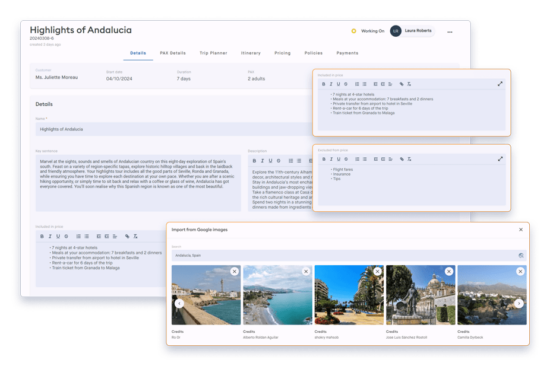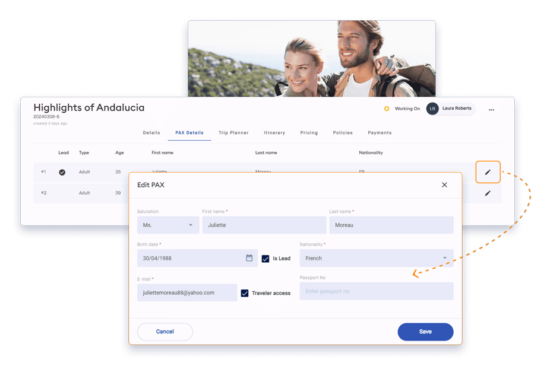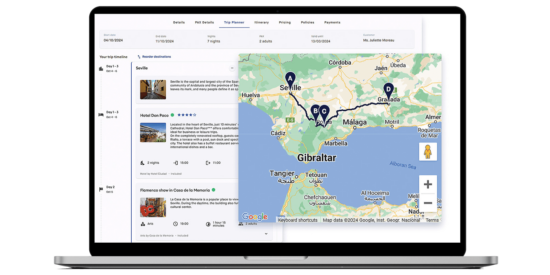
Elevating Your Travel Agency with Smart Marketing and SaaS Strategy

In an era where the online travel industry is more competitive than ever, standing out requires more than just offering the best deals or exotic locations. Where the competition is as fierce as a mid-summer travel rush, merely offering jaw-dropping deals or trips to hidden gems won’t cut it anymore.
It’s about diving deep into the market’s pulse, bringing a fresh zest to how you connect with wanderlust seekers, and harnessing the latest tech to make the travel planning process as smooth as silk for your customers. For travel agency owners navigating this packed field, carving out a niche is like finding a quiet spot in Times Square.
Yet, the magic wand here is digital marketing, a toolkit to survive and thrive. In this piece, we will unpack proven marketing strategies that promise to take your business to new heights and keep your audience hooked.
This is the moment to blend strategic marketing and SaaS (Software as a Service) into your game plan, turning hurdles into stepping stones for growth.
Understanding Your Market, Identifying Your Target Audience
Kicking off your marketing journey with a bang means zeroing in on your target audience and getting what makes them tick. The travel game has evolved; now, it’s all about crafting personalized, authentic adventures rather than one-size-fits-all packages. Identifying and understanding your target audience’s needs, desires, and pain points can set the foundation for your marketing strategies, ensuring you speak their language and meet them where they are.
Analyze Competitors
Look closely at what your competitors are doing right and where they might need to catch up. This insight allows you to differentiate your services and offer something unique to your audience. Whether it’s specialized tours or unmatched customer service, find your edge and use it to your advantage.
Crafting a Digital Homebase Your Visitors Will Love
Your website is your digital storefront, so make it welcoming. It’s the first impression your customers will have of your travel agency, and you want to ensure it’s a good one. A great website is not only visually appealing but also easy to navigate and accessible to people on the go who are browsing on their phones.
To create a killer website, you must pay attention to the details. High-quality images showcasing destinations and travel experiences in the best light possible are necessary. Along with that, it’s essential to have captivating descriptions that communicate what you offer and why customers should choose your business.
On top of being visually stunning, your website should also provide a hassle-free booking experience for customers. This means your booking process should be streamlined and easy to navigate, with clear calls to action guiding customers.
By focusing on those details, you can create a website that looks great, and practical and also provides a top-notch user experience that will keep customers coming back for more.
The Magic of SEO
Search engine optimization (SEO) is your behind-the-scenes ally, working its magic to bump up your site’s ranking in Google search results, making it simpler for adventure seekers to find you. Amp up your visibility with spot-on keywords, a speedy site, and engaging content that covers destinations, travel hacks, and reviews.
Content marketing is another arrow in your quiver. Crafting blog posts, guides, and videos that are both engaging and informative can supercharge your SEO efforts, positioning your agency as the go-to source for all things travel.
Leveraging Social Media
It’s important to choose the right social media platform for travel marketing. Instagram is great for sharing stunning travel photos, while Facebook is ideal for detailed travel tips and experiences.
Share travel stories, customer testimonials, and behind-the-scenes looks at popular destinations. Use hashtags, run contests, and engage with your social media followers to build a community around your brand.
Paid social media ads can extend your reach even further. Target your ads based on interests, location, and other demographics to ensure your ideal customers see them.
Email Marketing Strategies
Offer incentives like travel guides or discount codes in exchange for email sign-ups. This method helps build a list of interested customers you can engage with directly.
Design your emails to be eye-catching and informative. Include exclusive offers, new destination packages, and valuable travel tips to engage your audience.
Use Mailchimp or similar email marketing tools to reach out to your customers, automate your campaigns and personalize your messages. Personalized emails based on past bookings or interests can significantly increase engagement and conversion rates.
Using Analytics to Drive Success
Dive into tools like Google Analytics for a clear picture of how your site and campaigns are performing. Keeping an eye on metrics like page views and conversion rates can tell you what’s working and what’s not, helping you fine-tune your approach.
Use the data you collect to refine your marketing efforts. Stay nimble and pivot based on what the data tells you, as staying ahead in the digital world means being adaptable. If certain content types or marketing channels perform well, allocate more resources.
Adjust your strategies based on analytics. The digital landscape constantly transforms, and flexibility can be a substantial advantage.
The Role of SaaS in Travel Agency Management
Enter SaaS solutions like TripMatrix, which are designed specifically for the travel industry. These platforms are game-changers, offering automation, customer management, and data analytics tools. By tapping into TripMatrix’s travel agency software, agencies can smooth out their daily grind and craft more personalized, engaging experiences for travelers, all thanks to actionable data insights.
By leveraging TripMatrix, agencies can streamline their day-to-day operations and create more personalized, engaging customer experiences through data-driven insights.
Adapting to Advertising Trends & Strategies in 2024
The advertising landscape is ever-evolving, and keeping pace with trends is crucial. That is why 2024 sees a continued shift towards authenticity, demand generation, and omnichannel marketing. With the phasing out of third-party cookies, brands will need to find new ways to connect with audiences.
For travel agencies, this means creating marketing strategies that go beyond simply being visually appealing and offer a more immersive experience. This can be achieved through storytelling, leveraging user-generated content, and providing personalized experiences that resonate with customers on a deeper level.
By adopting these approaches, travel agencies can build genuine connections with their target audience and stand out in an increasingly competitive marketplace.
Implementing Authentic and Engaging Marketing Strategies
Authenticity is vital in today’s advertising world. Travel agencies should focus on creating content that resonates on a human level, such as real traveler stories, behind-the-scenes looks at destinations, and user-generated content showcasing real experiences. Partnering with micro-influencers can also offer a trusted voice to your campaigns, connecting with specific audience segments more intimately.
Conclusion
For new online travel agency owners, digital marketing presents vast growth opportunities. Key strategies include establishing a solid online presence, leveraging social media, deploying targeted email campaigns, and utilizing analytics for informed decisions. Start with focused goals, understand your audience, and maintain consistent efforts. With dedication, your agency can achieve significant success.
Adaptability is crucial in the ever-changing digital landscape. Regularly update and optimize your marketing tactics to stay ahead, encouraging innovation and the adoption of new technologies to remain competitive in 2024. Click here to find out more about TripMatrix.
Recent posts
The Best Travel Agency Software
What is Travel Agency Software? Travel agency software is a set of solutions built for travel agencies, tour operators, and DMCs to help them manage [...]
How Travel Management Software Can Reduce Corporate Travel Expenses?
More companies are relying on business travel agents to reduce corporate travel costs. Instead of employees self-booking their business trips, hiring [...]
What is a Travel Management Software?
Travel management software is an all-in-one system for organizing business travel. With the rise of business travel, there’s a need to simplify the [...]


